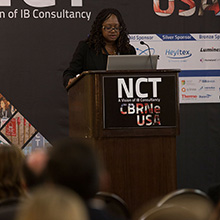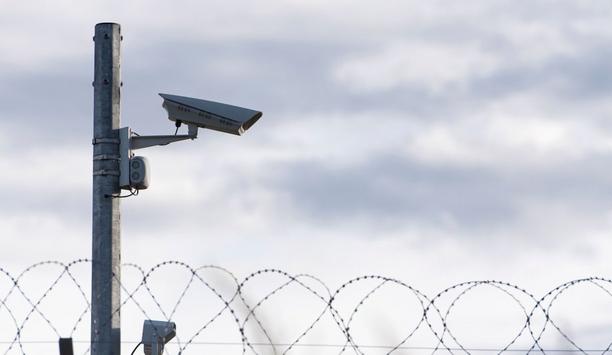 |
| NCT CBRNe USA 2015 was this year’s place to be for meeting the country’s leading decision-makers |
NCT CBRNe USA 2015: Setting a benchmark for high-quality CBRN events of the future
Giving an alternative to old-fashioned CBRN forums where stakeholders meet the same people and colleagues over and over again each year, NCT events are renowned for their high quality when it comes to international CBRN forums and to creating an interactive, intercultural CBRN community. However, NCT CBRNe USA 2015, the most recent member of the NCT CBRNe event series organised in cooperation with the National Consortium for the Study of Terrorism and Responses to Terrorism (START), established a whole new level of event quality. Taking place at the Sheraton Reston Hotel from April 29 to May 1 in the Washington DC Metropolitan Area and therewith the heart of the United States, NCT CBRNe USA 2015 was this year’s place to be for meeting the country’s leading decision-makers. Including two live demonstrations, workshops with leading CBRN researchers and scientists, as well as an outstandingly high-level conference program, NCT CBRNe USA 2015 attracted the ‘crème de la crème’ of the US CBRN community: from Ambassador Bonnie Jenkins (Department of State) to Brig. Gen. JB Burton (U.S. Army 20th CBRN Command), CDR Franca Jones (Office of the Deputy Assistant Secretary of Defense for CB Defense) and Carmen J. Spencer (JPEO-CBD), the high-level of attendance was unprecedented for a public CBRN event.
Interactive training and display of the Fairfax County Hazardous Material Response Team
The concept of NCT CBRNe USA 2015 was highly interactive: starting with a display and introduction of one of the country’s most sophisticated local Hazardous Material Response Teams (HMRT), the Fairfax County Fire and Rescue Department, delegates were able to touch base with the whole response team. Captain Mark Nash from the Fairfax HMRT gave outstanding insights in their response SOPs and available equipment. He explained their detection and monitoring capabilities, dressing capabilities, sampling, evidence collection and their approaches and equipment for the decontamination of personnel and citizens – for many delegates an outstanding opportunity to get a first-hand overview of the sophisticated capabilities of first responders dealing in first place with a CBRN incident.
NCT CBRNe this year had two live demonstrations, workshops with leading CBRN researchers and scientists, as well as an outstandingly high-level conference program |
The Conference and ‘Innovation Stream’: A place for networking of outstanding quality and diversity
The following two-day conference and workshops followed this interactive principle by assembling each single U.S. Department involved in CBRN response and respective homeland security activities (DoD, HHS, DHS, DoS, DoE). They brought with them their expert agencies such as NNSA, EPA, JPEO-CBD, ECBC, DTRA, and FDA. Political leaders such as His Excellency Prof. Dr. Aung Kyaw Myat (Deputy Minister of Science and Technology of Myanmar) and Senator Michael Balboni then lifted the whole event to another level and could be met in person on a coffee throughout the event at the VIP lounge.
Topics discussed included the State Department’s international CBRNe threat reduction activities, measures introduced to help mitigate the risk of nuclear terrorism such as NNSA’s Office of Nuclear Smuggling Detection and Deterrence (NSDD), DTRA’s capability development for CBRN defense and the JUPITR ATD Program in Korea. However, stakeholders primarily dealing with CBRN issues are still the nation’s Armed Forces, most of all the U.S. Army’s 20th CBRN Command represented by Brig. Gen. JB Burton. Together with the presentation of CDR Franca Jones (Office of the Deputy Assistant Secretary of Defense for CB Defense) and Lt. Aaron Jozsef (U.S. Coast Guard), his presentation gave an outstanding introduction into CBRN defense approaches as well as the respective transformation of requirements for CBRN defense on the battlefield.
Topics discussed included the State Department’s international CBRNe threat reduction activities, measures introduced to help mitigate the risk of nuclear terrorism |
In addition, representatives of local first responders from Florida, Minnesota, Virginia, Maryland, Washington DC, New Jersey and many others shared their expertise and case-studies either as speakers or attending delegates. This included overviews of the Cities Readiness Initiative (Stephanie Anspaugh-Naples, Florida Department of Health), the role of Public Health Laboratories in CBRN Crisis Management (Maureen Sullivan, Minnesota Department of Health), and CBRN response capabilities on the local level such as in Montgomery County Battalion Chief Christopher Feder (Montgomery HMRT). State of the Art of such civil CBRN response measures available was shown off in an outstanding live-demonstration of the ASPECT Program (Airborne Spectral Photometric Environmental Collection Technology) by the U.S. Environmental Protection Agency (EPA). For 90 minutes, EPA showcased for the first time live the transmission and analysis of data received from their respective aircraft based in Texas and thereby offered attending delegates to sit down with them behind their computer and simulate a live CBRN incident scenario.
Political leaders, military experts and local first responders were joined by outstanding researchers in the event’s ‘Innovation Stream’. For these workshops, leading scientists from all over the world were nominated after a call for papers from an official committee including representatives from DoS, HHS, the Homeland Defense and Security Information Analysis Center (HDIAC) and the National Consortium for the Study of Terrorism and Responses to Terrorism (START). Within an interactive workshop setting they gave an outstanding overview of how science and research can assist in international CBRN response and risk management.
Political leaders, military experts and local first responders were joined by outstanding researchers in the event’s ‘Innovation Stream’ |
From ISIS use of social media to preparedness for the next infectious disease, scenario-based training or the rapid detection of processed uranium in food, the array of presented studies was big. The line-up of more than 40 speakers in both the conference and the ‘Innovation Stream’ was rounded up by Dr. Ellen Jorgensen from Genspace, a nonprofit organisation dedicated to promoting citizen science and access to biotechnology. Giving an introduction during the conference of what DiY biohacking can offer, she provided another stand-point of how science now provides potential terrorists with new opportunities, but how it can contribute to better preparedness, public health and response.
Establishing innovation and quality in public CBRN shows: mission accomplished!
By assembling leading politicians, Armed Forces, civil first responder agencies and diverse researchers in an innovative networking setting, NCT CBRNe USA 2015 accomplished its mission to establish a new kind of events that actually introduces international actors and ground-breaking experts in order to create a larger and interactive CBRN community. Communication is key, which is why the open exchange of expertise within a wide array of qualified and innovative experts, decision-makers and procurement stakeholders is necessary to better fight the threat of CBRN in the future. With its very first edition, NCT CBRNe USA 2015 already has an outstanding track record within the internationally successful NCT events series.


















